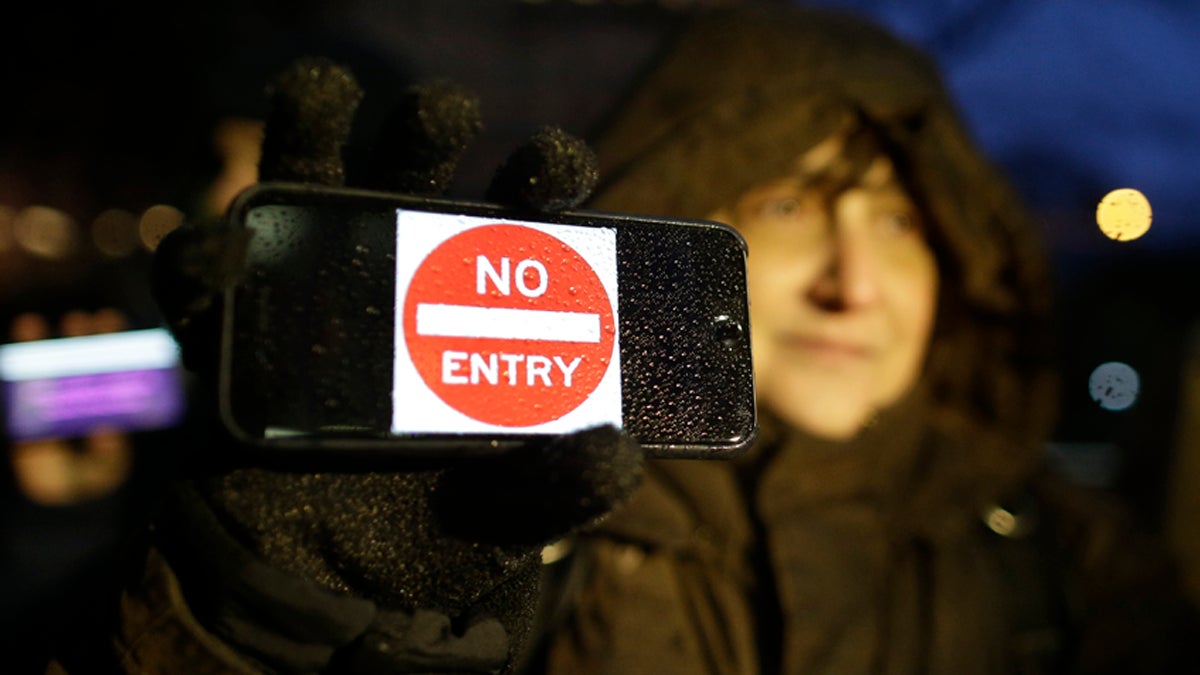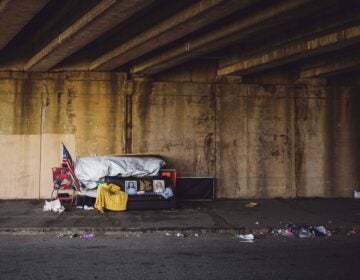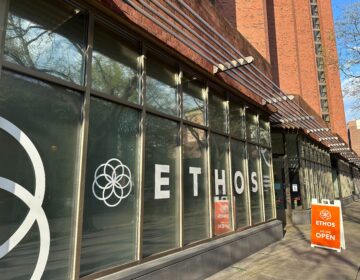Police in Philly, nationwide say investigations hampered by encrypted iPhones
Listen
A demonstrator stands outside the Apple store on Fifth Avenue
Law enforcement officials in Philadelphia are closely monitoring the debate over whether Apple should unlock an iPhone used by one of the shooters in the San Bernardino attack.
How the courts decide to balance the security versus privacy question could drive the course of many open criminal investigations happening in the city.
In the fall of 2014, Apple made a big switch: Encryption went from being optional to the default on its iPhones.
Hoping to uncover the communications of deceased shooter Syed Rizwan Farook, the FBI is asking that Apple disarm an auto-erase feature that would delete the content of Farook’s phone after ten unsuccessful password guesses.
Testifying to the U.S. House of Representatives’ Judiciary Committee on Tuesday, FBI Director James Comey said public safety depends on going to courts and getting warrants, even if encryption technology stands in the way.
But developing a work-around, Apple responded, would be unreasonably burdensome and potentially affect the privacy of thousands of customers down the road.
Hackers and cyber criminals could use the unlocking technology to wreak havoc on phones, Apple’s General Counsel Bruce Sewell told lawmakers on Tuesday.
It’s a test case that most legal experts say will be resolved either by the U.S. Supreme Court, or by new federal legislation. Meanwhile, Philadelphia’s crime fighters are left in the lurch.
Criminals in several cities are now reportedly doing business on newer phones knowing that they have a shield against law enforcement probes.
Police Commissioner Richard Ross said criminals in Philadelphia are increasingly seeking those phones.
“Certainty it’s a reality that they have. And right now, it seems to be something in their favor,” Ross said.
And does Ross think bad guys in Philly are doing business on encrypted phones have an edge?
“I think they do,” Ross said. “And particularly those who do things of a terrorist nature.”
It’s a concern echoed by local law enforcement officials around the country. Since local police and prosecutors investigate the vast majority of crimes that happen in the country, how the San Bernardino case ends will have a trickle effect nearly everywhere.
Authorities in Los Angeles have said they have more than 400 phones in custody they can’t crack that are connected to crimes under investigation. New York’s District Attorney has said more than 200 un-breakable phones in its possession. A spokesman for Philadelphia’s District Attorney’s Office declined to comment on how many encrypted phones it has in evidence lockers.
Nonetheless, Temple law professor Duncan Hollis said local police and prosecutors, in Philly and elsewhere, are putting cases on hold until the rules are clarified.
“Where do you say, ‘we want you to investigate crimes, but we don’t want you to be on everyone’s phone like Big Brother, watching everyone all the time?” Hollis said.
He said the last so-called crypto-war in the 1990s between the telecommunications industry and the federal government was resolved with an act of Congress. And since, phone companies have to allow authorities to wiretap phones when there’s a court-approved search warrant.
On the murky waters over the current encryption battle, Hollis is less hopeful for a speedy solution. In an election year, he points out, it’s often difficult to pass controversial legislation.
Yet if Congress does decide to do something, the ACLU’s Esha Bhandari said it needs to favor privacy. She said police already have reams of data on who we’re talking to, where we travel and other activity leaving a digital trail.
“And the push for encryption has been, in part, driven by a sense that people want to regain some of that balance, and some of that control over their private data that has been lost in the current digital environment,” she said.
Local law enforcement officials insist that digital evidence is huge in terms of catching murderers, rapists and thieves. And that ignoring court orders and subpoenas is ducking a civic responsibility of abiding by the law.
But privacy advocates such as Bhandari ask, should private companies like Apple really be working at the behest of police to serve as essentially surveillance agents?
Until it’s cleared up, all the locked phones in the custody of Philadelphia authorities will remain that way.
In Bhandari’s view, federal law enforcement officials have not yet made a compelling case that it — and local authorities — cannot fully do their job without keys to unlock encryption. If law enforcement is given a backdoor way to get at the data, there will be consequences, she said.
“It will have a huge chilling effect on what people feel comfortable saying and doing,” she said. “And it will also render us all vulnerable to hacking and attacks by cyber criminals and other malicious actors.”
WHYY is your source for fact-based, in-depth journalism and information. As a nonprofit organization, we rely on financial support from readers like you. Please give today.




